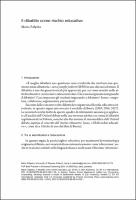Chapter Il dibattito come rischio educativo
| dc.contributor.author | Załęska, Maria | |
| dc.date.accessioned | 2022-06-01T12:22:43Z | |
| dc.date.available | 2022-06-01T12:22:43Z | |
| dc.date.issued | 2021 | |
| dc.identifier | ONIX_20220601_9788855183291_585 | |
| dc.identifier.uri | https://library.oapen.org/handle/20.500.12657/56400 | |
| dc.description.abstract | «It is better to debate a question without settling it than to settle a question without debating it», says a quote from Joseph Joubert. Debate is one of the most valued text genres and is therefore included in curricular or extracurricular academic activities. What do we teach by teaching how to debate? What do students learn by learning how to debate? They can compete, collaborate and might even develop a new skill. Since concrete educational choices reflect a certain underlying educational philosophy, in what follows the model proposed by Biesta (2010,2016,2017) will be illustrated. The theoretical knowledge drawn from this framework will then be applied to the analysis of the Oxford Debate, in the version adopted by the regulated debate tournaments in Poland as well as to the discussion of a modification of the Oxford Debate itself, inspired by the concept of 'risk of education' (or rather, 'The Beautiful risk of educatio', as the title of one of Biesta’s books reads). | |
| dc.language | Italian | |
| dc.relation.ispartofseries | Communication and Philosophical Cultures. Researches and Instruments | |
| dc.subject.other | Argumentation Theory | |
| dc.subject.other | debate | |
| dc.subject.other | education | |
| dc.title | Chapter Il dibattito come rischio educativo | |
| dc.type | chapter | |
| oapen.identifier.doi | 10.36253/978-88-5518-329-1.06 | |
| oapen.relation.isPublishedBy | bf65d21a-78e5-4ba2-983a-dbfa90962870 | |
| oapen.relation.isbn | 9788855183291 | |
| oapen.series.number | 1 | |
| oapen.pages | 11 | |
| oapen.place.publication | Florence |

